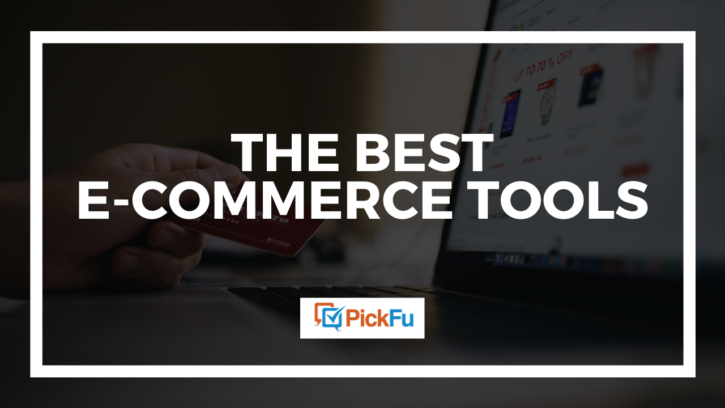What are e-commerce tools? Software that helps you run your business online. E-commerce has grown so much as shoppers want the convenience of having products delivered to them. If you’re thinking of running an e-commerce store, there’s a lot to learn.
Many aspects go into running a business, especially an e-commerce store. This includes where to host your store, A/B testing, and how to get feedback, just to name a few.
To help, we’ve narrowed down some of the best e-commerce tools for you to investigate and choose from.
E-commerce tools to build your online store
An e-commerce store can be solely online or can be the online accompaniment to a physical store. Whether you have a physical store or you’re looking to sell products as a passive income, having an e-commerce store is a great idea.
First and foremost, you need to choose a platform for your store, also known as a website host. See a full review of our top 5 of the best e-commerce website tools: Shopify, WooCommerce, Squarespace, BigCommerce, and Wix.
Shopify
Shopify is an easy-to-use way to build your own website from an array of themes (free and paid). You can also enlist the help of a Shopify Expert to help build your store in case you get stuck.
Shopify has paid tiers, with a basic option being about $29/month. Shopify is only available in certain countries, which means depending on where you live, Shopify may already not be an option for you.
WooCommerce
If you already have a WordPress site, then you’re in luck. WooCommerce integrates seamlessly with WordPress.
As a WordPress plugin, WooCommerce requires you to have a WordPress.org site (vs. a WordPress.com site). If you don’t want the hassle of hosting your site, you can also look into WordPress Business Plan for about $300/year.
Squarespace
Aside from great customer service, Squarespace offers many appealing features built-in to its website design. This includes SEO help, landing pages, email campaigns, and more.
Squarespace is, first and foremost, a website. Because e-commerce services are secondary to this platform, you may find features and support lacking in certain areas.
BigCommerce
BigCommerce lives up to its name where it allows multiple accounts if you have staff members or more than one shop. You can keep tabs on all your different stores through this one platform.
If you’re looking to start a shop and you’re new to the e-commerce scene, BigCommerce may not be for you. It caters to stores that are already well established.
Wix
Wix is easy to use with plenty of theme options for your store. It’s also a website builder so you can seamlessly create both your store and a business website to go along with it.
Wix is on the pricier side at $49/month. Once you choose a theme for your store, you can’t change it, so make a wise choice from the get-go.
How to choose the right e-commerce tool for you
When looking for an e-commerce store, there are many factors to think about:
- How well will your brand be presented?
- What are the platform’s monthly costs?
- How easy is it for you to use?
Fortunately, some platforms offer free trials. Utilize this option and if you’re not 100% comfortable or sure the host is right for you, test out another platform, and compare them for yourself.
E-commerce tools for Amazon A/B testing
A/B testing, or split testing, is an experiment to see which variable (A or B) converts more customers. For example, if you have two logo ideas in mind, you can test both to see which one is more appealing to your target audience.
It’s important to implement some kind of testing mechanism when launching a new service or product. You want to double-check your hunches with quantifiable data. If you’re selling through Amazon, here are some of the best Amazon A/B testing tools that we looked into.
Splitly
Splitly helps you to create different versions of your listing and rotate them on Amazon. In doing so, you can see which variant seems to be the most popular and gets the most clicks and buys. Testing variants include price, images, description, and more.
Editor’s note: Splitly shut down on Sept. 15, 2021.
Cashcowpro
Similar to Splitly, Cashcowpro rotates the variants on Amazon. However, the rotation is more frequent than Splitly and the findings are presented to you in a spreadsheet.
Listing Dojo
Listing Dojo focuses solely on Amazon A/B testing and it’s free. You can test up to seven variants and Listing Dojo will do the work for you. However, it doesn’t use an algorithm, so you’ll need to declare the winner yourself.
PickFu
PickFu is run outside of Amazon so that you can test a product or listing even before it’s for sale. Results come in more quickly and are generally more conclusive than live tests.
You can even choose your targeted audience based on many different demographics such as age, gender, and more. Based on your PickFu poll results, you can add your photo, title, or another variant you’ve tested to Amazon with ease, already knowing you’ve made the right choice.
E-commerce tools to collect product feedback
Product feedback is just as it sounds — it’s feedback on the products you sell from customers who have bought it. Receiving feedback on your products is important for a couple of reasons. One, you need to know what your customers like (or dislike) about what they buy. It’s a great way for you to improve and discover what your customers want or need.
Two, it’s also a great way for customers to see what your product is all about. If other buyers speak highly of your product, then chances are their experience could convince new buyers.
We’ve looked at the best product feedback tools for online reviews and customer surveys.
E-commerce tools for online reviews
Trustpilot
Trustpilot is free to use for customers and also has free features for businesses. It seems to be a win-win for everyone. While the customer support doesn’t seem to be the best, Trustpilot works hard to keep fake reviews out.
Feefo
Feefo integrates nicely with e-commerce stores such as Spotify, WooCommerce, and BigCommerce. Feefo will automatically email customers to leave a review after they’ve bought a product.
ReeVoo
While ReeVoo is designed for medium and large businesses, this is one to keep in your back pocket if your business isn’t quite there yet. ReeVoo gathers reviews from your customers as well as stories and images they share online about your products or business.
E-commerce tools for customer surveys
Typeform
Typeform is one of the better-looking options to run customer surveys. You can easily customize the look of your surveys so that they integrate with your website. Typeform gathers the information you need, though you might find the data visualization isn’t as flexible as you might expect.
SurveyMonkey
SurveyMonkey is one of the better-known customer survey sites. The surveys are easy to create as well as for customers to navigate. If you’re interested in SurveyMonkey alternatives, check out the linked article!
SurveyGizmo
Aside from surveys, you can also create quizzes using SurveyGizmo. This program is easy to use and has a good amount of features to utilize.
E-commerce tools for Amazon feedback
The following tools are specific to Amazon and make sure to adhere to Amazon’s ever-changing TOS. We’ve taken a look at the 5 best Amazon feedback tools.
FeedbackWhiz
FeedbackWhiz offers more than gathering feedback; you can also manage your orders, use its analytics tool, and more. FeedbackWhiz helps you get in direct contact with customers who leave poor reviews so you can help fix whatever problem they’re having.
BQool
BQool offers a lot of different services for your Amazon business. It has an email system to automatically send review requests from customers as well as to answer questions from your customers.
AMZFinder
This tool focuses on Amazon reviews alone. You can send emails to customers asking for reviews, get notified whenever a positive or negative review is left, and help your customers when they’re having trouble.
Feedback Genius
Similarly to the other tools, Feedback Genius gathers reviews through automated emails and sends these emails at an optimal time catered to each individual customer. It will also notify you of new reviews.
The best e-commerce tools: a recap
Overall, there’s a lot to think about when launching your e-commerce store, from finding a host to A/B testing, and collecting reviews. While we’ve discussed a lot of e-commerce tools today, the final decision is yours.
Take your time looking through each tool and choose the one that best fits the needs of you and your business.
Be sure to use PickFu
Sure, we may be biased, but PickFu is a great tool for business owners and entrepreneurs of all stripes.
For e-commerce sellers in particular, you can test variants of your product with PickFu before you commit to inventory or go into production. You can choose the best product name and packaging design to appeal to shoppers. And you can use PickFu to perfect your photos, product titles, and marketing copy by understanding customer concerns.







